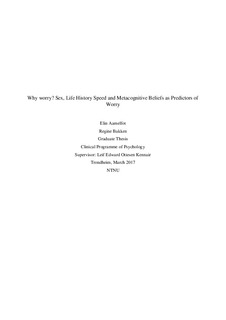| dc.description.abstract | Worry is by some theories viewed as a decisive part of a successful way of dealing with life’s problems. Other theories perceive worry as problem-focused rather than problem-solving cognitive processing. Complex patterns of traits, and thus behavior, among humans result from an interaction between environmental and cultural variations. The aim of this study was to compare the predictive power of sex of participant, strategies regarding how individuals invest resources in order to optimize evolutionary fitness, and metacognitive beliefs upon worry. Data were collected from a survey of a total of 813 individuals, including undergraduate students from both Norway and Midwestern U.S, and Americans from all four regions (specified by the US Census Bureau). Predictions from competing hypotheses derived from among other Life History (LH) theory, Metacognitive therapy, and biological theories of sex differences, were tested. Regression analyses indicate that metacognitive beliefs are the best predictors of worry when comparing sex, LH speed and metacognitions. However, the predictive strength of negative metacognitions upon worry was nearly halved after including emotional stability in the analysis, and the effect of positive metacognitions was slightly affected. In accordance with previous research, females reported more worry and metacognitive beliefs than men did. Mediation analyses revealed that slow LH speed was associated with less worry as mediated by negative metacognitive beliefs. When accounting for emotional stability, emotional stability predicted worry best. Culture was only associated with negative metacognitions. Our findings are relevant to theories about the nature of worry. Future research regarding the relationship between metacognitions and worry should consider the effect of emotional stability and culture on this association. Also, more research on the relationship between LH speed and worry is called for. | nb_NO |
